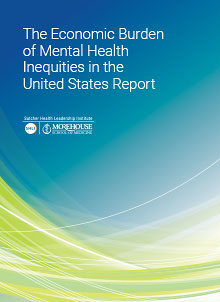The unmet need for mental health care places a staggering burden on minority communities. A new report by the Satcher Health Leadership Institute at Morehouse School of Medicine puts that burden into stark perspective.
The report estimates that there were 116,722 premature mental and behavioral health–related deaths among Indigenous populations and racial and ethnic minority groups between 2016 and 2020. The report also estimates that the total excess cost burden between 2016 and 2020 from premature deaths caused by mental illness, substance use, and suicide among these groups amounted to $278 billion.
“There are many factors that go into why these numbers are so large,” said Walter E. Wilson Jr., M.D., M.H.A., chair of APA’s Council on Minority Mental Health and Health Disparities. “We need to take a comprehensive, holistic approach to make sure that minority and marginalized populations get better access to quality mental health care so we can bring these numbers down.”
“The Economic Burden of Mental Health in the United States Report” was written by leaders of the Satcher Health Leadership Institute, including the institute’s executive director, Daniel Dawes, J.D. Dawes and his colleagues examined the prevalence of mental illness among adults, youth, and children from 2016 to 2020, specifically looking at minority populations including American Indians, Alaska Natives and Native Hawaiians, Asian Americans, Black/African Americans, and Hispanic/Latinx Americans.
The authors used numerous databases, including the National Survey on Drug Use and Health, the National Survey of Children’s Health, the Medical Expenditure Panel Survey, and National Vital Statistics Systems Mortality data. They estimated the national prevalence of mental illness, service use and health care costs, additional medical costs attributable to mental health inequities, and premature deaths from mental illness.
The authors noted that their estimate of 116,722 excess premature deaths related to mental illness is likely a vast undercount. About 5.8 million Americans are excluded from the sampling datasets that they reviewed, they wrote, including those who are incarcerated, unhoused, or living in assisted living facilities or psychiatric facilities.
They estimated that the excess burden of mental illness and substance use disorders among people who are unhoused or incarcerated cost $63 billion to $92 billion, inequities that are emphasized by the prominent racial disparities among these groups. Further, Black/African American, Hispanic/Latinx, and Indigenous peoples are five times more likely to be incarcerated than their White counterparts.
Overall, the excess deaths “are undue and are related to reversible inequities that persist within and beyond the United States’ health care and behavioral health systems,” the report states.
The authors pointed to numerous drivers of these inequities, including structural barriers to accessing care, cultural differences in pursuing behavioral health care, biased delivery of care, and social determinants of health. An estimated 48% of White Americans with mental health concerns are connected to care, they noted. However, only 31% of Black and Hispanic Americans are connected to mental health care, and Asian Americans are the least likely to be connected to care at 22%.
Wilson said this low rate among Asian Americans is especially concerning and encouraged his fellow psychiatrists not to overlook this group. “Asian Americans are often lumped together, but they represent a myriad of subgroups,” he said. “We often overlook this population and view them as a privileged group, but we forget that many Asian Americans are marginalized and more likely to fall through the cracks.”
The authors offered a slew of policy recommendations that can help meet the mental health needs of historically marginalized communities, including policies that make investments in mental/behavioral health systems, increase culturally centered mental health care, and address the social determinants of mental health. Recommendations include expanding Medicaid in all states and improving mental health parity by allowing the Department of Labor to assess civil monetary penalties for parity violations, an APA-supported proposal that has also been introduced in bills in both the House and Senate.
Many of the policy recommendations center on improving family-based services and parenting services, and Wilson emphasized the importance of supporting families. Members of minority communities are rightfully distrustful of the health care system, and because of that mistrust, initial signs of mental illness are usually kept quiet and dealt with within the family or community.
“By the time they present to a specialist like me, they are already far down the severity course of their illnesses,” he said. “As a child/adolescent psychiatrist, a great deal of what I do is talk to parents about parenting strategies. If parents, families, and communities had more resources, we could help address these problems earlier on.” ■


